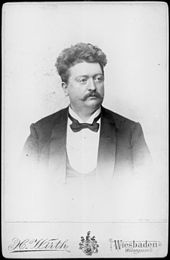Albert Fuchs (composer)
Albert Fuchs (born August 6, 1858 in Basel , † February 15, 1910 in Dresden ; full name: Leonhard Johann Heinrich Albert Fuchs ) was a Swiss-German composer , conductor , music educator and music critic and collector of historical musical instruments.
Live and act
Fuchs was the son of a master bookbinder, who was born in 1806 and worked in Basel, whose father came from Mannheim, where he was a tobacco manufacturer. Fuchs' mother was born in 1834. Albert Fuchs attended high school in Basel. Already at this time he received a musical education, which he deepened from 1876 to 1879 in Leipzig at the Conservatorium der Musik . The music theorist Salomon Jadassohn and the composer and pianist Carl Reinecke , whose training he graduated with honors , gave him the finishing touches . At that time Reinecke was director of the Leipzig Gewandhaus Orchestra .
Fuchs got his first job in 1880 in Trier , which belonged to the Prussian Rhine Province , where he conducted oratorios and orchestral concerts as music director .
Only three years later he retired to Saxony . In Oberlößnitz at the gates of the royal seat of Dresden , he bought a winery for a few years (now known as Haus Steinbach ), on which he "[...] realized [his] compositional plans".
At the end of the 1880s, Fuchs acquired the conservatory in Wiesbaden, originally founded by Wilhelm Freudenberg and closed under Otto Taubmann , and moved from Nice in Saxony on the Elbe to the Nice in the north on the Main . Wiesbaden, soon to be known as the imperial city , developed at that time as a result of the imperial spa visits to become the city with the most millionaire families in Germany. There he ran his own conservatory between 1889 and 1898, "whose reputation as a universal music pedagogue he again consolidated with H. Riemann ." Riemann came to him from the princely conservatory in Sondershausen in 1890 for the next five years and brought his pupil Max Reger with him. Fuchs gave regular house concerts with Reger at the harpsichord, in which he tried out examples of his historical instruments, which were found as the basis of his collection of historical instruments .
With the call to the Royal Conservatory in Dresden , Fuchs returned to the Elbe in 1898. He was appointed there as a teacher of theory and singing and was honored with the title of Royal Professor in 1908. During this time in Dresden, the main works composed by Fuchs, his oratorios , which he premiered as the conductor of the Robert Schumann Singing Academy, fall . In addition, Fuchs worked as a music critic by writing "highly regarded" reviews for the Dresdener Zeitung .
Aftermath
Fuchsen's compositional works such as sacred and secular choral works as well as songs and oratorios have been forgotten today. What remains, however, are the services he has earned in researching historical musical instruments. By using the copies he had acquired for his collection in concerts, he sustainably promoted the revival of so-called early music from the epochs before around 1750 that was beginning at that time .
Honors
Fuchs was awarded the title of professor in 1908 . In Dresden, Fuchsstrasse is named after him .
Works
Compositions
- Blessed are those who die in the Lord. 1906.
- The millennial kingdom. 1908.
- Nirvana. (in the estate).
Editing
- Several Italian vocal compositions
Fonts
- On the history of the opera: a souvenir sheet of Peri's and Caccani's operas published in 1600. (= Report of the Conservatory for Music and Theater in Dresden; 44) Warnatz & Lehmann, Dresden 1900.
- Estimate of the string instruments. 1907.
literature
- Stanley Sadie : The new Grove dictionary of music and musicians. Macmillan, London 1980.
- Alfons Ott: Fuchs, Leonhard Johann Heinrich Albert. In: New German Biography (NDB). Volume 5, Duncker & Humblot, Berlin 1961, ISBN 3-428-00186-9 , p. 676 ( digitized version ).
- Theodore Baker : A Biographical Dictionary of Musicians. 3rd edition, 1919.
- Monographs of modern musicians. Vol. III: 15 biographies of contemporary composers with portraits. CF Kahnt successor, Leipzig 1909.
- MGG, Vol. 7, 2002, Col. 226.
Web links
- Sheet music and audio files by Albert Fuchs (composer) in the International Music Score Library Project
- Albert Fuchs estate in the Saxon State Library - Dresden State and University Library (largely lost during the war)
- Fuchs, Albert (Leonard Johann Heinrich Albert) at musicsack.com
Individual evidence
- ^ Address book Kötzschenbroda 1886, p. 100 : Owner Fuchs, Albert Componist; middle mountain road Cat.No. 53. According to the address book Radebeul 1939, p. 70, Cat.-No. 53 = Bennostraße 41.
- ^ A b c d Alfons Ott: Fuchs, Leonhard Johann Heinrich Albert. In: New German Biography (NDB). Volume 5, Duncker & Humblot, Berlin 1961, ISBN 3-428-00186-9 , p. 676 ( digitized version ).
- ^ Slub-dresden.de: Short biography Albert Fuchs. ( Memento from October 6, 2014 in the Internet Archive )
- ↑ a b The German-language press: A biographical-bibliographical handbook. P. 308.
| personal data | |
|---|---|
| SURNAME | Fuchs, Albert |
| ALTERNATIVE NAMES | Fuchs, Alb .; Fuchs, A .; Fuchs, Leonhard Johann Heinrich Albert (full name) |
| BRIEF DESCRIPTION | Swiss-German composer, conductor, music educator and music critic |
| DATE OF BIRTH | August 6, 1858 |
| PLACE OF BIRTH | Basel |
| DATE OF DEATH | February 15, 1910 |
| Place of death | Dresden |
